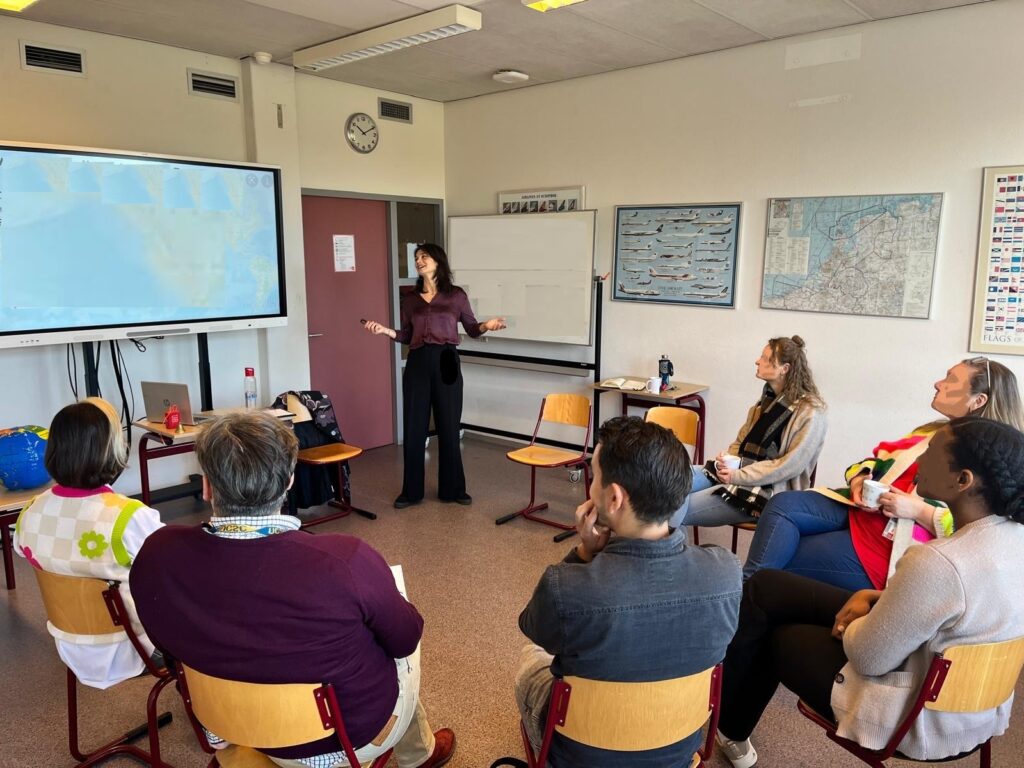How do our values and assumptions affect interactions with others? Awareness about the impact of culture on professional life is key for effective collaboration.The topic is culture, not ethnicity. A specialized, bicultural role play actor (m/f) ensures a dynamic in which there is room for experimenting with different types of behavior. The atmosphere will be safe, inviting and pleasant. Results:
- Better collaboration in culturally mixed teams
- More understanding for bicultural and international colleagues/ students/ PhD candidates
- More self-knowledge, less quick to judge
- Tools for dealing with cultural differences effectively
- Team building

What do clients say?
‘This has been an eye-opener experience: using a very efficient, interactive and condense format it moves away from theoretical, dry approaches to abstract principles and terminology; instead, Janneke takes a deep dive into the most confronting realizations about cultural impact and makes you aware of your own daily misleading assumptions. I’m really grateful that I was offered the opportunity to follow this training!’ Evgenia Salta PhD, Group Leader – Neurogenesis and Neurodegeneration Lab, Netherlands Institute for Neuroscience (NIN-KNAW):
“Since I supervise multiple (PhD) students from abroad the session on intercultural communications was such an eye opener for me. Participating in the roleplay(s) was very confronting but also a great practical learning opportunity. I think it’s literally useful for anybody. ”Maryse van ’t Klooster, Assistant Professor Technical Physician, Department Brain, Neurology & Neuro Surgery, Universitair Medisch Centrum Utrecht
“This course is something that everyone needs. I gained valuable insights into understanding different cultures and how they can have an impact on all our communication. It was a really enjoyable and interactive course. I appreciate the innovative teaching style, and I believe Janneke’s knowledge is beneficial not just for my career but also for my personal life.” Annemijne, PhD candidate Graduate School of Life Sciences
“The workshop was really well-structured and I very much appreciated the diverse perspectives and real-life examples provided. The actor did an incredible job and practicing the feedback conversations was a nice opportunity. It provided me with valuable insights into various communication styles, enhancing my awareness of my own style and its potential impact on students from diverse cultural backgrounds.” Esther Lenssen, PhD candidate Toxicology and Environmental Health – POLYRISK
“The seminar on intercultural communication was a remarkable experience, thanks to the engaging speaker who skillfully balanced both informative content and audience engagement. In just 1.5 hours, she made learning about often overlooked aspects of intercultural communication not only educational but also incredibly enjoyable, leaving us with valuable insights and a newfound appreciation for cultural diversity. Later that same evening, I had the chance to immediately apply what I had learned during the seminar, which proved instrumental in helping me navigate a potentially tricky intercultural communication situation with confidence and success”. Felice Veen, PhD candidate at the Netherlands Institute for Neuroscience
Evaluation Mercedes Benz Financial Services: “The course was an eye opener. I liked it very much, it’s the best way to build teams. This works better than the teambuilding day we’ve had” “Interesting day, I didn’t know cultural differences could have such an impact, it’s not just about personal differences” “I liked it very much, it’s good to be aware of cultural differences” “I found the course refreshing, I enjoyed it very much” “I learned a lot about how other cultures perceive Dutch hospitality. “I know now how important jokes are. Some jokes are considered to be funny by the Dutch, but people from other countries may feel insulted by them” “We have to find a way to spread this on other levels. Spread the word, coach your staff!” “I was convinced that there were no cultural differences within our team. Now I know better! I’ve learned to stop making assumptions” “It was extremely interesting” “You did perfect!” “It was a safe environment, pleasant, you did well”.
Comments PhD supervisors – Graduate School of Life Sciences (Utrecht University): The course was very interesting. Its really good to be aware of the cultural background of the people you interact with. But also to be aware of your own culture and assumptions. Especially because nowadays you work with a lot of international people. “The course on Intercultural Communication was an eye-opener, really learned new things that I will apply in practice during supervision and in every day life”. “Janneke, thank you for the inspiring and informative session. I learned a lot”. “Excellent course on intercultural communication, please keep it up!”
